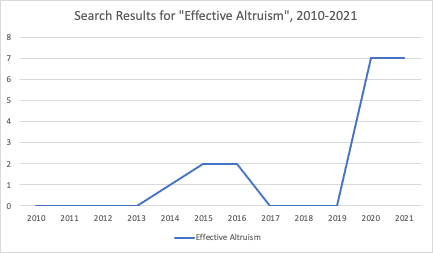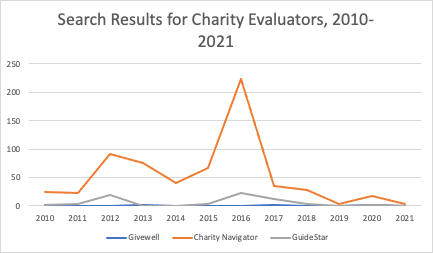Cross-posted from Cold Button Issues
Why is effective altruism so bad at getting on TV? The average American adult spends over four hours per day watching TV. But TV programs almost never mention effective altruism.
Internet Archive lets you search the TV captions of major news programs back to 2009. This could produce an under-count of mentions of effective altruism- but I’m skeptical that would be a big problem because I doubt sitcoms, soap operas, or TV dramas spend much time talking about effective altruism. There also could be missing results due to misspelling or other errors. Finally, the included programs are heavily weighted to American programs, so this isn’t a truly global perspective. Still, I found the results interesting.
Here’s how often effective altruism and charity evaluators were mentioned by these programs according to a search of Internet Archive’s Television Archive.

RT (Russia Today) provided the most mentions of effective altruism.
GiveWell was also rarely mentioned on TV.

There are five results for “GiveWell” over this time period buts it’s hard to see because GiveWell is virtually never discussed compared to its non-EA competitors. I was surprised by the GiveWell figures since I feel I often hear them mentioned on random podcasts I listen to, but I know my listening tastes aren’t typical.
I don’t know that the rarity of TV mentions is a bad thing. GiveWell, for instance, continues to move more money. But I did find it striking given the focus on outreach and growing the community, that effective altruism in nearly non-existent on television, one of the most powerful cultural mediums.

Effective altruism probably has received minimal coverage in TV news because EA does not offer compelling content for TV news. EA doesn't have riveting visuals like a war zone, building fire, or local crime scene. EA won't help viewership for outlets and doesn't provide many newsworthy moments--even someone making a massive donation can only really get reported once. We often think about bias in the news media from an ideological perspective, but an even more important bias is the needs of the medium itself. TV news wants something new and interesting to show and talk about in a short, easy-to-understand story. In contrast, EA has received far more meaningful coverage in print/digital journalism and podcasts where different factors are at work.
Should we care about how much airtime EA receives? Maybe. It sounds like you're envisioning a goal of widespread awareness of effective altruism. Increased EA awareness might then influence charitable giving , motivate more people to pursue EA-related jobs, and so forth. A communication campaign could help, and that would usually start with a goal and target audience. In the for-profit world, you're often marketing a product or service to a relevant group of people to increase sales. In the altruism context, you might be trying to change knowledge, beliefs, or behaviors (e.g., get vaccinated or donate to our nonprofit).
Television is a diverse and important medium but should be seen as a tool to share information, not necessarily an end goal in itself or even a metric for success. But if you want to embrace a big goal of widespread public awareness, the Diffusion of Innovations theory pioneered by Everett Rogers is a good place to start. Effective altruism is an "innovation," and there are many strategies and tactics to diffuse or spread this idea through a group of people.